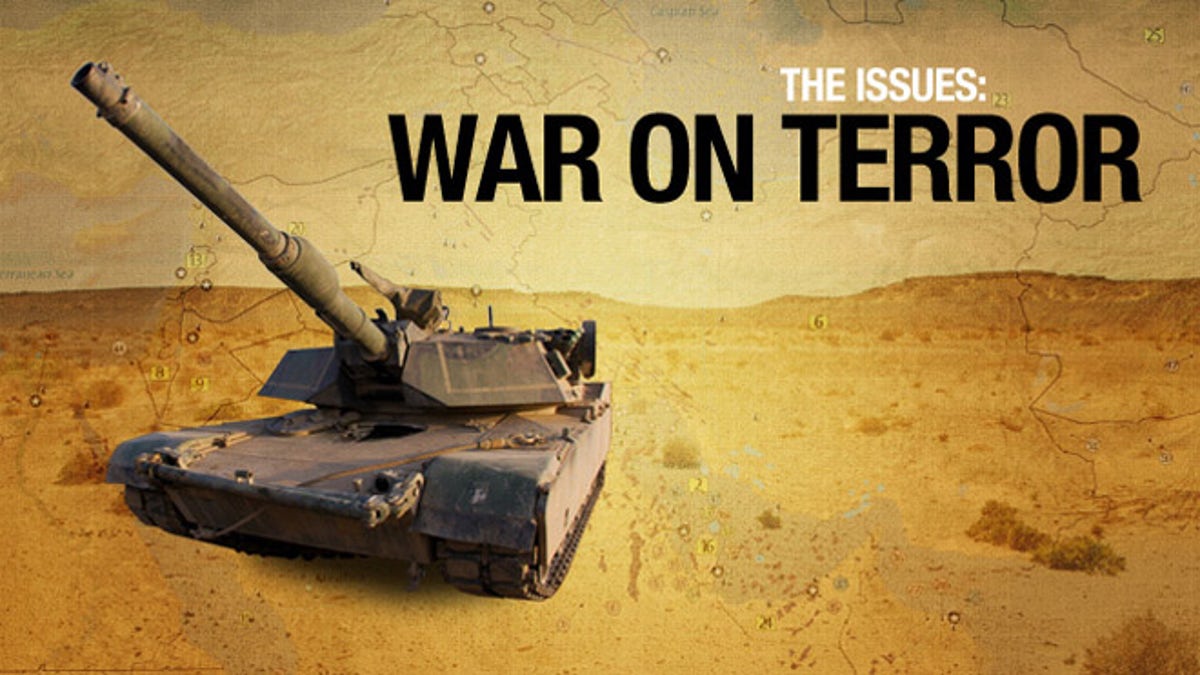
Throughout the presidential campaign, Fox News will be breaking down the key issues and giving viewers an in-depth look at the positions of President Obama and presumptive GOP nominee Mitt Romney. The first article in the AEHQ Issues series focuses on national security and the war on terror.
President Obama and Mitt Romney have faced off in recent days in a bitter debate over the alleged politicization of the Usama bin Laden raid, one year ago.
It's hardly surprising. They don't agree on much -- be it strategy or the political rhetoric about that strategy -- when it comes to the war against Al Qaeda that has outlived the man who was once the world's most wanted terrorist.
Obama took office vowing to recapture what he saw as the moral high ground in the war on terror, to make it easier for allies to support the U.S. and more difficult for terrorist organizations to recruit. He promised to close the detention facility at Guantanamo Bay, though Congress blocked him even when Democrats controlled the House and the Senate.
But Romney has said he'd double the size of the Guantanamo facility, if need be, and has defended the "enhanced interrogation" techniques, like waterboarding, that Obama banned as torture.
Their differences extend far beyond policy, even to semantics.
Early in his presidency, Obama took issue with the phrase "war on terror," preferring "war against Al Qaeda," to better identify the enemy and better focus America's efforts on Afghanistan instead of Iraq, a war he considered a distraction. "We will bring this war to an end. We will focus our attention on Afghanistan," Obama, then a senator, had promised while campaigning in 2008. Now, ending the unpopular war in Iraq has become, in the president's eyes, a campaign promise delivered.
But polls suggest public opinion has turned against war in Afghanistan, and the president and his challenger are at odds over the timetable for ending it.
Less than a year into his term, Obama announced a surge of 30,000 U.S. troops to the war in Afghanistan, promising that after a period of 18 months, the United States would begin drawing down its military force in the war. Last June, he announced that all of the "surge troops" would be back by fall 2012.
Romney accused the president of sending mixed messages to allies and enemies alike. The Republican candidate said putting a timetable on troop withdrawals encouraged the Taliban to wait out the U.S. presence in Afghanistan. And he saw the fall 2012 deadline as timed to coincide with the fall election, suggesting it was politically motivated.
Romney's political advisors say the troop withdrawals should be based on benchmarks instead of deadlines, to make sure the Afghan army is able to stand on its own. But the advisers admit getting the Afghans to agree to benchmarks instead of deadlines would require much more trust between the two countries than exists now. And extending what is now this country's longest war has little support in the general public.
The former Massachusetts governor give Obama credit for authorizing the military operation that ultimately killed Usama bin Laden -- but the credit it grudging. Romney has said "even Jimmy Carter" would have made the call, suggesting he, Romney, would have done the same. But in 2007, Romney said, "It's not worth moving heaven and earth spending billions of dollars trying to catch one person." A week later, during a May 2007 Republican debate, Romney seemed to change his stand, saying as president he would "get Usama bin Laden and track him wherever he has to go."
Meanwhile, Obama's re-election campaign has an ad noting Romney's initial comments and questioning how much effort should be spent going after bin Laden. That has drawn criticism even from some Democrats who feel it's an unseemly politicization of a difficult and dangerous mission by Navy SEALs.
Meanwhile, Obama's administration has confirmed U.S. drone strikes against other Al Qaeda leaders in Pakistan. His is the first administration to do so publicly, pushed by a need for openness with the American public and a need to convince Pakistan that Al Qaeda is the most serious threat. "We've tried to get conversations between Afghans and Pakistanis going more effectively than they have been in the past. But we've still got more work to do," Obama said.
Romney maintains that the work needed to be done on Pakistan involves severing connections between insurgent forces and Pakistan's security and intelligence forces. Experts say those connections explain why bin Laden was able to hide so close to a Pakistani military encampment for so long, without the country's intelligence service notifying the U.S. Obama administration officials say focusing exclusively on that would rob the U.S. of what help the Pakistanis provide.
But what do voters think about the two men's focus on the relationship with Afghanistan and Pakistan?
An ABC News/Washington Post poll last month showed 47 percent of voters trust Obama to do a better job handling terrorism, while 40 percent think Romney would be more successful.
But when asked which politician can be trusted to perform overall on handling international affairs, Obama comes out over Romney 53 percent to 36 percent.
In his first major foreign policy speech, Romney promised that if elected he'd conduct "a full review of our transition to the Afghan military to secure that nation's sovereignty from the tyranny of the Taliban." Delivering remarks at The Citadel Military College of South Carolina in October, Romney spoke of his strategy to consult field generals on their recommendations, and his intent to reassess the plan "free from politics."
Fox News' Wendell Goler contributed to this report.




